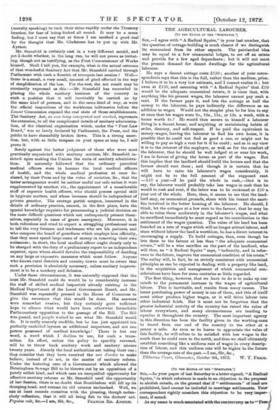THE AGRICULTURAL LABOURER.
(TO THE EDITOR OF THE "SPECTATOR.")
SIR,—I agree with "A Radical Squire," in your last number, that the question of cottage-building is much clearer if we distinguish its economical from its other aspects. The patriarchal idea may be equal to a few ornamental lodges, to set off an estate and provide for a few aged dependents; but it will not meet- the present demand for decent dwellings for the agricultural. labourer.
He says a decent cottage costs £150; another of your corre- spondents says that this is the full, rather than the medium, price..
I believe it to be a very low estimate, and I cannot realise it ; bat even at 1150, and assuming with "A Radical Squire" that £1G' would be the adequate economical return, it is clear that, with
anything like his present wages, the labourer cannot pay moll a
rent. If the farmer pays it, and lets the cottage at half the money to the labourer, he pays indirectly the difference as as addition to wages. Would not the simpler plan be for him to say
at once that his wages were 9a., 103., 115., or 12s. a week, with a. house worth 4s.? He would. then secure to himself a labourer-
living in a decent house, and acquiring or maintaining habits of
order, decency, and self-respect. If he paid the equivalent in money-wages, leaving the labourer to find his own house, it is-
possible that he could not find as good a one, or might not be willing to pay so high a rent for it if he could ; and as in my view it is to the interest of the employer, as well as for the comfort of the labourer, that he should be well lodged at or near his work,. I am in favour of giving the house as part of the wages. But this implies that the landlord should build the houses and that the- farmer should rent them ; and though it is certain that he- will have to raise his labourer's wages considerably, it might not be to the full amount of the supposed rent —110 a year—if he paid the whole in cash,—that is to say, the labourer would probably take less wages in cash than he- would in cash and rent, if the latter was to be reckoned at £.10 a year out of the whole. Here, then, it seems to me that the land- lord may, on economical grounds, share with his tenant the sacri- fice involved in the better housing of the labourer. He should, I think, let the cottages at a low rent to the farmer, that he may be- able to value them moderately in the labourer's wages, and what he sacrificed immediately he must regard as his contribution to the settlement of the wages question. The value of his land has been founded on a rate of wages which will no longer attract labour, and since without labour the land is worthless, he has a direct interest ia encouraging a supply. To build cottages, then, even though he- lets them to the farmer at leas than "the adequate economical return," will be a wise sacrifice on the part of the landlord, who.
will thus, as "A Radical Squire" says, "indirectly, and in refer- ence to the future, improve the economical condition of his estate."' The outlay will, in fact, be as strictly consistent with economical. principles as can be expected in dealing with a property like land,. in the acquisition and management of which commercial con.- siderations have been for some centuries so little regarded.
The first thing, however, that we have to do is to make up our minds to the permanent increase in the wages of agricultural labour. This is inevitable, and results from many causes. The- lesser purchasing power of money is one of them, and this of itself must either produce higher wages, or it will drive labour into other industrial fields. But it must not be forgotten that the greater industrial activity of the country has raised the value of labour everywhere, and many circumstances are tending to equalize it throughout the country. The most important agency
in this direction has been the facility given to the working-man to travel from one end of the country to the other at a
penny a mile. As soon as he learns to appreciate the value or this facility, he will refuse to be satisfied with leas wages in the south than he could earn in the north, and thus we shall ultimately establish something like a uniform rate of wages in every descrip- tion of labour, and this uniform rate will be higher in the future- than the average rate of the past. —I am, Sir, &c.,
Tibberton Court, Gloucester, October 8th, 1872. W. T. Palm


































 Previous page
Previous page